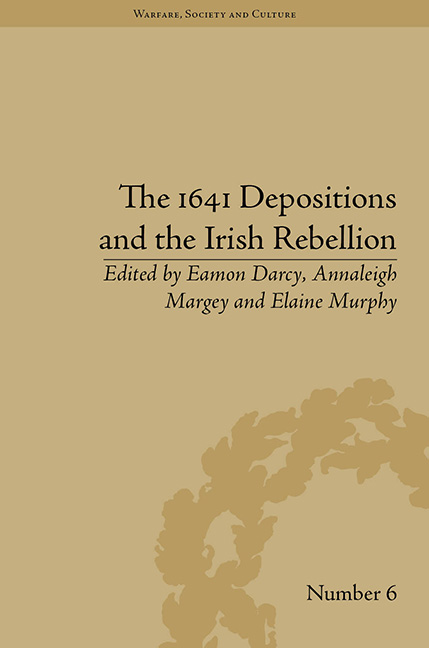Book contents
- Frontmatter
- CONTENTS
- Dedication
- Acknowledgements
- List of Contributors
- List of Figures and Tables
- List of Abbreviations
- Preface
- Introduction
- Part I The Outbreak of the Rebellion
- Part II Social Aspects of the Rebellion
- Part III Political and Military Aspects of the Rebellion
- Conclusion: The Rebellion in Text and Context
- Notes
- Index
Conclusion: The Rebellion in Text and Context
- Frontmatter
- CONTENTS
- Dedication
- Acknowledgements
- List of Contributors
- List of Figures and Tables
- List of Abbreviations
- Preface
- Introduction
- Part I The Outbreak of the Rebellion
- Part II Social Aspects of the Rebellion
- Part III Political and Military Aspects of the Rebellion
- Conclusion: The Rebellion in Text and Context
- Notes
- Index
Summary
In 1991, to mark the 350th anniversary of the outbreak of the rebellion that was to lead to the baleful transformation of Ireland, the ‘Protestant and Catholic Encounter’ movement held a conference in Portadown, scene of one of the most notorious atrocities of the first phase of the rebellion, to reflect on that troubled past. Out of the conference arose a volume of academic papers entitled Ulster 1641: Aspects of a Rising. It was in truth the first serious attempt at a rounded account of the causes, course and consequences of the ‘rising’ or ‘rebellion’ that started on the night of 2⅔ October 1641. Edited by a Jesuit and with a foreword by the Church of Ireland Archbishop of Armagh, it sought to add to the ‘growing library of honest attempts to unravel our past’. It was in that sense a revisionist text, seeking to be ‘value-free’ and to present ‘the past on its own terms’. As such, it stimulated the ire of Brendan Bradshaw, then my colleague in Cambridge and advocate of a post-revisionist, frankly nationalist account of Ireland's history. Reviewing Ulster 1641 in the TLS Bradshaw wrote that: ‘revising the “Risings” has been a major preoccupation of historians of Ireland, ever since the subject achieved the status of an academic university-based discipline there [in the 1920s]’, and he called that collection ‘a missed opportunity’. He was especially cross that so many of the distinguished authors bought into Aidan Clarke's revisionist belief that the risings of 1641 were ‘a bolt from the blue’. Rejecting an earlier nationalist denial of the evidence of mass killings so fully chronicled in the 8,000 depositions sworn by survivors of the alleged ‘massacres’ and so graphically described in hundreds of pamphlets, many of which were based on the depositions, published in London in the months and years after November 1641, Bradshaw asserted that ‘the linked grievances of land and religion, subsumed under the political one of the treatment of Ireland as a colony, hold the key to the Ulster Rising in 1641’.
- Type
- Chapter
- Information
- The 1641 Depositions and the Irish Rebellion , pp. 185 - 196Publisher: Pickering & ChattoFirst published in: 2014



